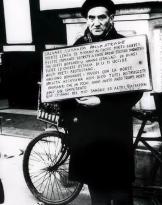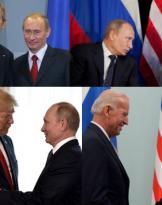This contribution is based on the current international scene, also with regard to the theaters in which our Armed Forces are involved in various capacities, and the bills that, in recent months, have received media coverage, attracting interest of the writer both as a jurist attentive to military issues, and as a "politician" and who, albeit in opposite directions, highlight the centrality and ever-increasing importance that civil-military cooperation must (or should) assume and offer the for some reflections, considerations and proposals.
I refer, in particular:
the popular initiative law concerning the "Institution and financing methods of the Department of Non-armed and Non-Violent Civil Defense", promoted by a series of various movements, groups and associations, adhering to the "Another defense is possible" campaign; to the proposal launched by the Minister of Cultural Heritage and Tourism, Dario Franceschini who, in an interview with 'The Guardian', last March, asked for the creation of a United Nations peacekeeping force to protect the world heritage sites risk from Isis.
As for the first, it is a bill that, filed with the Supreme Court of Cassation in July last year, has seen the 50.000 signatures reached just in recent days, with the relative delivery of all the file in the Chamber of Deputies.
Before entering into the merits of the aforementioned proposal, it is curious to underline, on the one hand, that the aforementioned signature collection began, as mentioned, just over a year ago, on the occasion of the first "Republic Day that repudiates war" , which took place on June 2nd; on the other, his (of the proposed law) "political coverage" which, since then, would have had the current President of the Chamber, Hon. Laura Boldrini.
In addition to the above, scrolling through the pages of the reference website (http://www.difesacivilenonviolenta.org/grazie-alle-firme-da-tutta-italia...), it seems that, to join the initiative, were also "dozens of Mayors of large and small cities (Rome, Milan, Naples, Genoa, Reggio Emilia, Pavia, Modena, Messina, Vicenza, Livorno, Cagliari ...) and of many Municipal Councils, such as the Legislative Assembly of Emilia Romagna ".
Entering the merits, however, the bill in question consists of only four articles: the most interesting for the purpose of this contribution is the article 1 that explains the nature and purpose of this new tool that should be even alternative (mind you) : not complementary) to armed defense.
In paragraph 1, in fact, it is stated that "In compliance with the constitutional principle of repudiation of war, referred to in Article 11 of the Constitution of the Italian Republic, and in order to favor the fulfillment of the mandatory duties of political, economic and social solidarity , referred to in Article 2 of the Constitution, and the fulfillment of the duty of defense of the Homeland referred to in Article 52 of the Constitution, an alternative form of defense to the military one called "Civil defense, unarmed and nonviolent ", as a defense tool that does not involve the use of weapons and an alternative to the military one".
Subsequently, in paragraph 2, it is specified that "For the purposes referred to in the previous paragraph, the" Department of civil defense, unarmed and nonviolent "is established at the Presidency of the Council of Ministers, on which the following depend: 1) the Civil Corps di Pace, the experimentation of which is included in the Law of 27 December 2013, n. 147 which provides for the establishment of a contingent to be engaged in non-governmental peace actions in areas of conflict or at risk of conflict or in areas of environmental emergency; 2) the Research Institute on Peace and Disarmament, to be established with a specific subsequent law ", while, in the following paragraph, that" For the purposes referred to in Article 1 Paragraph 1 of this law, the "Department of civil defense non-armed and nonviolent "must provide for forms of interaction and cooperation with:
the Department of Civil Protection as reference body of the National Civil Protection Service regulated by the 12 Law July 2012, n. 100 and subsequent amendments and additions to the Department of fire brigades, public rescue and civil defense hinged at the Ministry of the Interior; the Department of Youth and National Civil Service regulated by the DPCM 21 June 2012, in particular with the establishment of a "National Council of Civil Defense, unarmed and nonviolent" among the aforementioned Departments with joint tasks of addressing and comparison to be regulated with subsequent Regulation issued by the Presidency of the Council of Ministers in agreement with the Ministry of the Interior ”.
Finally, in paragraph 4, the tasks of this new and futuristic defense tool are finally specified which, according to the proponents, should consist of the "1" defending the Constitution, affirming the civil and social rights enunciated in it, the Republic and the independence and freedom of democratic institutions in the country; 2) to prepare plans for unarmed and nonviolent civil defense, to coordinate their implementation, and to carry out research and experiments, as well as forms of implementation of unarmed civil defense, including the necessary training and education of the population; 3) carry out research for peace, disarmament, for the gradual production differentiation and conversion of civil defense industries and for the correct and lasting resolution of conflicts, and prepare studies aimed at the gradual replacement of armed defense with the civil non-violent one, provide for the training of personnel belonging to its structures; 4) to promote the prevention of armed conflicts, reconciliation, mediation, the promotion of human rights, international solidarity, education for world peace, inter-religious dialogue and in particular in conflict-prone areas of conflict or post-conflict; 5) to organize and direct the structures of unarmed and non-violent civil defense and to plan and coordinate the use of the vehicles and personnel assigned to it; 6) to combat situations of social, cultural and environmental degradation and to defend the integrity of life, assets, settlements and the environment against damage caused by natural disasters ".
The notations to be advanced would be different, but, for necessity of space and contingency of arguments, I will limit myself to highlight what specified in the art. 4, co. 4, n. 3, where mention is made of the gradual replacement of armed defense with nonviolent civil defense. It is now common ground that, even in the face of the laws 230 / 1998 and 64 / 2001, for "duty of defense" (art. 52 Cost.) We must relate to more forms of compliance: both in military and armed sense, and in an unarmed and non-military sense (therefore "civil"). But it is equally clear that the ordinary definition of "national defense" remains regulated in l. 14 November 2000, n. 331, which attributes to the Armed Forces the "priority task of the defense of the State", and the task of operating "for the purpose of achieving peace and security, in accordance with the rules of international law and the determinations of the international organizations of which the Italy is part ”. Furthermore, they must contribute "to the safeguarding of free institutions" as well as carry out "specific tasks in circumstances of public calamity and in other cases of extraordinary necessity and urgency" which they fulfill with the forces that may be available, that is if they are not committed to fulfilling the priority task indicated by law. Consequently, as stated by a doctrine on the subject almost unanimously, for national defense it is necessary today to understand the complex of military and civil predispositions, measures and actions, which allow the Nation to prevent and deal with crisis and emergency situations, internal and international , as well as armed conflict.
Among other things, if it is true, as claimed by the proponents of this bill, that the art. 11 of our Constitution provides for the repudiation of war as an instrument of offense, does not exclude it, but as an instrument of defense, as also foreseen by the Charter of the United Nations (of which Italy is part) which in turn, while forbidding principle the use of force (Article 2), specifies that none of its provisions affect the natural right of individual and collective self-defense, and expressly provides for the possibility of using armed force to react to aggression (Article 51), or in case it is necessary to defend peace (Title VII).
It is therefore evident the current and necessary dichotomy between civil defense and military defense, but the promoters of the law seem to ignore that:
already with the DPCM of February 18, 2004, an advisory committee for non-armed and non-violent civil defense (DCNAN) was established at the Presidency of the Council of Ministers; that precisely this Committee has highlighted what the writer has reiterated up to now, namely the necessary complementarity - and not alternatives - of civil and military defense, also from the point of view of the Treaties and of the international organizations to which Italy is a part; that, precisely in order to harmonize military defense interventions within the framework of the rules dictated by the Atlantic alliance, with explicit reference to the tasks - for the residual truth - that the 1992 law also attributes to the Armed Forces in terms of civil protection (which in this case it must certainly be considered "civil defense"), there is a "Military Center for Civil Defense" at the Defense Staff which annually organizes civil-military cooperation courses. that, regarding the role of the military and civilians in conflict areas, especially with regard to the conflict prevention phase, but also to the different forms of peacekeeping and civil peacebuilding, in operational terms they cannot be traced back to the operational level exclusively to the project area included in the current SCN system To put it in other words, it is not considered possible to entrust the role of non-military peacekeepers in full to civil service operators only (even if specially trained), just as it is undeniable that some projects and some subjects involved in the civil service system still constitute today. privileged references for the conduct of peace operations, reconciliation, conflict prevention, management and transformation.
Well, of all this, the proponents of the above mentioned law, and their political referents, do not seem to take into account: on the other hand, in the legislative text there is no mention of any interaction or synergy with the Ministry of Defense or, however, with military authorities.
Furthermore, such a proposal does not even take into account the current international scenarios (the crisis in Ukraine, the different situations in the Middle East and the North African region, as well as the unsettled instability in the SAHEL region, to name a few ).
In this regard, in his recent speech, held in Rome, on the occasion of a workshop on the "Civilian-Military Integration in the planning, Admiral Luigi Binelli Mantelli, then Chief of Staff of the Defense, underlined the importance of an increasingly growing "comprehensive approach", ie a holistic and coordinated approach not only between EU countries, but, within them, between the civil and military components, especially in the political-strategic level structures at Brussels, to face, resolve or at least mitigate the increasingly dynamic and complex crises that characterize the European and world scenario (in this sense, I am witness to the importance of effective civil-military integration, for example, European operations in the Horn of Africa, such as EUNAVFOR Atalanta, EUTM Somalia, EUCAP NESTOR).
Against this, we reiterate the total inappropriateness and inconsistency with the reality of the bill, which, among other things, has already been brought to the attention of our Parliament and which, as mentioned, seems to have exceptional political support.
In this perspective, it appears to offer the right summary of what Franklin D. Roosvelt had already stated years ago: “Competition has been shown to be useful for today, begins where competition leaves off ".
In a diametrically opposite sense, however, the proposal of Minister Franceschini seems to go (who has already had the "applause" of the Director General of Unesco, Irina Bokova, and already under consideration by the VII Senate Commission), mentioned above and object here of brief considerations that take their cue from the sad consideration that armed conflicts have constituted and still constitute one of the main causes of damage and destruction of the cultural and world heritage, not only for reasons of necessity to achieve a military objective but also because, in the strategy of the subject aggressor, the attack on cultural heritage is equivalent to an attempt to cancel the identity and historical memory of the enemy (from the very ancient "Carthago delenda est" to the current havoc of ISIS). Well, following the 1949 Geneva Conventions and the 1954 Hague Conventions (and the Second Protocol of 1999), the attacks against cultural heritage today constitute serious violations of international humanitarian law and, in the context of a conflict, can be considered national crimes, war crimes or even crimes against humanity: these considerations are not separated from the reflection that Italy holds half of the entire cultural heritage in the world and the highest number of assets considered "heritage of 'humanity ", in addition to the fact that, with its Armed Forces, it is one of the first contributors to the UN for participation in peace support missions, they have precisely induced the Defense Staff to draw up a directive that outlined in general the salient elements of the rules, conventions and protocols intervening on the subject in order to disseminate the preventive and sanctioning regime within the Armed Forces people in the matter. This training is certainly preparatory to that which our soldiers, in turn, must provide abroad, in the missions in which they are engaged, and which see, among their tasks, also those of training and mentoring: So, precisely with regard to Cultural Heritage, the need for ever greater and intense civil-military cooperation appears even more evident, also due to the particular subject matter dealt with and the specific professional skills required.
In view of Minister Franceschini's proposal, given the considerations made so far, it is believed that our Armed Forces may well be the point of reference, even within the UN, in the theoretical and practical preparation of future - and desirable - helmets blue teams specialized in the defense of Cultural Heritage, in a natural context of civil-military cooperation especially, in this case, with professionals and civil entities belonging to the world of art and culture.
Marco Valerio Verni
[The author, lawyer of the Court of Rome, is an expert in criminal law, military criminal law and international humanitarian law. Officer on leave (Role Commissioners) of the Italian Red Cross Military Corps is a qualified advisor to the Armed Forces for the application of the DIU in armed conflicts and a member of the International Relations Sector of the Order of Lawyers of Rome.]












